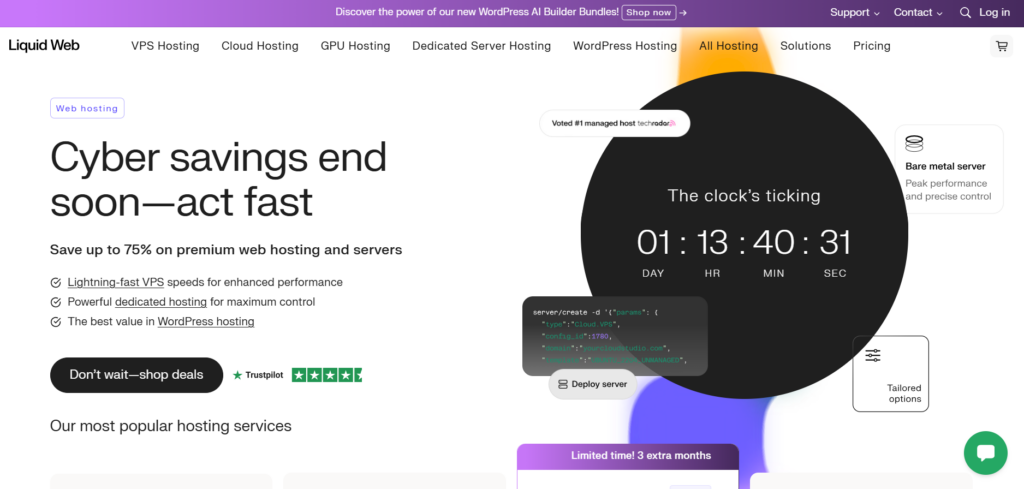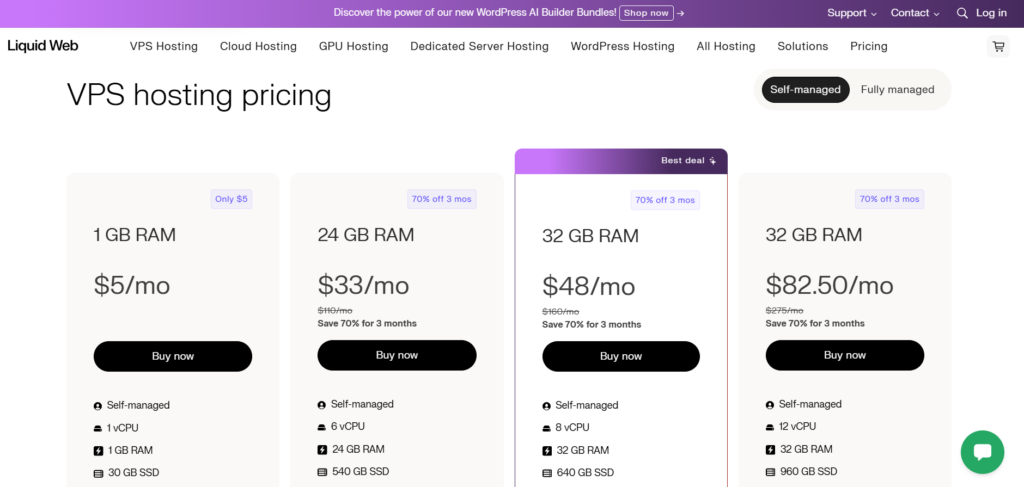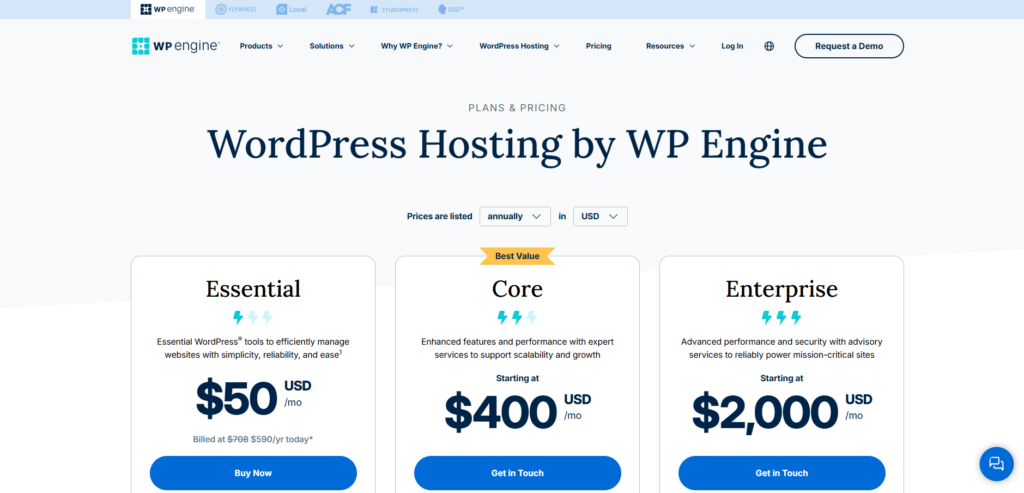When it comes to choosing a web hosting provider, Liquid Web and WP Engine are two of the top names in the game. Both offer high-quality managed WordPress hosting, but which one is the best fit for your needs?
Liquid Web is known for its reliability, offering a wide range of hosting options like VPS and dedicated servers.
It’s great for businesses that need extra customization or have high-traffic sites. WP Engine, on the other hand, specializes in WordPress hosting and focuses on providing a super smooth experience with excellent performance and support.
In this comparison, I’ll break down their key differences, so you can figure out which one offers the best value and performance for your website. Whether you’re just starting out or running a high-traffic site, there’s a hosting solution here for you. Let’s dive in!
Liquidweb
Liquid Web is a managed hosting provider offering high-performance cloud hosting, dedicated servers, VPS hosting, and managed WordPress and WooCommerce solutions.

Catering to businesses of all sizes, Liquid Web is known for its robust infrastructure, exceptional customer support, and 99.999% uptime guarantee.
Its services are designed for mission-critical websites and applications, providing scalable solutions with advanced security and customization.
Liquid Web prioritizes reliability and performance, making it a trusted choice for developers, agencies, and enterprises seeking powerful hosting solutions.
WP Engine
WP Engine is a premium managed WordPress hosting provider specializing in speed, security, and scalability for websites.

Catering to businesses, developers, and agencies, it offers robust features like automated updates, daily backups, and advanced security.
WP Engine’s proprietary EverCache technology ensures fast load times, while its global CDN optimizes site performance. The platform includes staging environments, developer tools, and 24/7 expert support.
With a focus on reliability and innovation, WP Engine empowers users to create exceptional digital experiences.
Top Features Comaparison: Liquid Web vs WP Engine
When comparing WP Engine and Liquid Web, it’s essential to evaluate their key features to determine which aligns best with your website’s needs. Here’s a comparison of eight critical features:
1. Performance and Speed:
- WP Engine: Utilizes EverCache® technology and a global Content Delivery Network (CDN) with over 200 points of presence to ensure fast page load times.
- Liquid Web: Employs high-speed AMD EPYC and Intel Xeon processors, offering a 10 Gbps network for rapid data transfer. However, it doesn’t provide a managed CDN like WP Engine.
2. Scalability:
- WP Engine: Offers a highly scalable architecture with isolated resources, allowing for seamless handling of traffic spikes without manual upgrades.
- Liquid Web: Provides scalable VPS hosting with easy upgrades and cloud dedicated servers, though scaling may require more manual involvement compared to WP Engine’s automated approach.
3. Security:
- WP Engine: Features enterprise-grade security with proactive threat detection, blocking over 26 billion attacks annually, along with managed Web Application Firewall (WAF) and DDoS mitigation.
- Liquid Web: Offers real-time malware scanning, intrusion detection, and proactive monitoring, with real-time DDoS protection and intrusion detection systems.
4. Backup and Restore:
- WP Engine: Provides daily automated backups with one-click restore functionality, ensuring data safety and easy recovery.
- Liquid Web: Performs daily backups stored for 30 days, offering a reliable backup solution.
5. Developer Tools:
- WP Engine: Includes 1-click tools for setting up development, production, and staging environments, facilitating streamlined development workflows.
- Liquid Web: Provides iThemes Sync Pro for managing multiple sites from a single location, along with staging environments for testing before deployment.
6. Customer Support:
- WP Engine: Offers 24/7 live chat support with phone support available on higher-tier plans.
- Liquid Web: Provides 24/7 support via phone, live chat, and email, with rapid response times—under a minute for phone or chat, and under 30 minutes for email.
In summary, WP Engine excels in performance optimization and developer-friendly tools, making it ideal for WordPress-centric sites.
Liquid Web stands out with robust security measures and comprehensive customer support, catering to a broader range of applications beyond WordPress.
Your choice should depend on your specific requirements, such as the need for specialized WordPress features or broader application support.
Pricing Comaparison: Liquid Web vs WP Engine
Liquid Web Pricing:

1. Managed WordPress Hosting:
- Spark Plan: Starts at $15/month.
- Maker Plan: Priced at $59/month.
- Designer Plan: Available at $99/month.
2. VPS Hosting:
- 2 GB RAM: Starts at $59/month.
- 4 GB RAM: Priced at $99/month.
- 8 GB RAM: Available at $139/month.
Liquid Web positions itself as a premium hosting provider, offering high-performance managed hosting solutions tailored for businesses, e-commerce sites, and agencies that require robust and scalable services.
Wp Engine Pricing:
WP Engine offers a range of managed WordPress hosting plans tailored to various needs:

| Plan | Monthly Price (Annual Billing) | Monthly Price (Monthly Billing) | Sites Included | Visits/Month | Storage | Bandwidth/Month |
|---|---|---|---|---|---|---|
| Startup | $20 | $30 | 1 | 25,000 | 10 GB | 50 GB |
| Professional | $39 | $59 | 3 | 75,000 | 15 GB | 125 GB |
| Growth | $77 | $115 | 10 | 100,000 | 20 GB | 200 GB |
| Scale | $193 | $290 | 30 | 400,000 | 50 GB | 500 GB |
Why Liquid Web Might Be Considered Better:
1. Comprehensive Support:
Liquid Web offers 24/7 support via phone, live chat, and email, with rapid response times—under a minute for phone or chat, and under 30 minutes for email.
2. Automatic Plugin Updates:
Liquid Web provides automatic plugin updates, ensuring that your site remains up-to-date and secure without manual intervention.
3. Versatile Hosting Solutions:
Beyond WordPress, Liquid Web offers a range of hosting solutions, including VPS, dedicated, cloud, and WooCommerce hosting, catering to a broader array of business needs.
4. Security and Compliance:
Liquid Web caters to extensive compliance needs, including PCI, GDPR, and HIPAA, making it suitable for businesses with stringent regulatory requirements.
In summary, while both providers offer competitive pricing, Liquid Web’s comprehensive support, automatic updates, versatile hosting options, and robust security features may make it a more attractive option for businesses seeking a holistic hosting solution.
The Final Verdict
Liquid Web edges out WP Engine for its superior scalability, customizability, and performance. It offers a wider range of hosting options, including VPS, dedicated, and cloud hosting, while WP Engine mainly focuses on managed WordPress.
Liquid Web’s top-tier customer support and robust security features, like free daily backups and proactive monitoring, also set it apart.
Additionally, Liquid Web’s flexibility allows businesses to scale as needed, making it a better choice for growing enterprises seeking more control and reliability.
FAQ’s
Which is cheaper?
Liquid Web generally offers lower starting prices than WP Engine.
Which has better customer support?
Liquid Web provides 24/7 support via phone, chat, and email with fast response times.
Which offers more hosting options?
Liquid Web offers a variety of hosting types, including VPS and dedicated servers, unlike WP Engine.
Which is faster?
Both are optimized for performance, but WP Engine’s EverCache and CDN enhance WordPress speed.
Which is better for scalability?
Liquid Web offers scalable VPS and cloud hosting, while WP Engine is excellent for WordPress scaling.
Which is more secure?
Both provide robust security, but Liquid Web offers additional compliance features like PCI and HIPAA.


